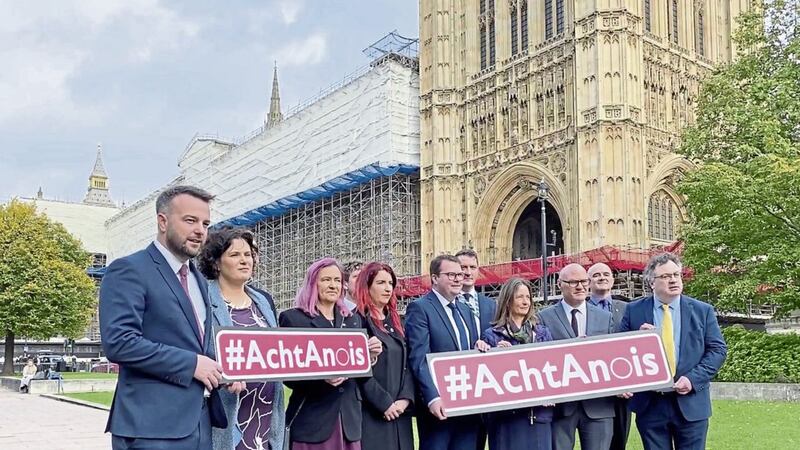There’s a curious ambivalence among local parties about Westminster legislation overriding Stormont’s paralysis and about UK government interference.
The DUP is furious about Westminster legislation circumventing their antediluvian attitudes and religious prejudices, but display no concern about central government interference in Stormont’s business. Sinn Féin and the SDLP take exactly the opposite position.
They all need to be a bit more cautious.
It’s true that if it weren’t for outside bodies like the European Court of Human Rights or indeed Westminster, the DUP, with sneaky tacit UUP support, would keep this place somewhere in a 1950s time warp: film censorship, silent Sundays with parks closed, swings padlocked and ducks’ feet hobbled to stop them swimming. No, only kidding; they never did that. External decisions have produced gay rights, same-sex marriage, abortion (though the DUP with UUP connivance still delays its implementation), not to mention fair employment and equal opportunities laws before the administration the Good Friday Agreement established. All approved by the majority of parties here.
On the other hand in March 2021 when the British government announced it was opening an office in Belfast of the Ministry of Housing, Communities and Local Government there was strong objection from the SDLP minister Nichola Mallon. She said the decision was, “the latest step in dismantling devolution and removing power from local people.” She added, "It will sit outside the programme for government, there won't be any executive oversight, there won't be any assembly scrutiny or accountability.” Sinn Féin’s Conor Murphy agreed.
The DUP however were delighted. Diane Dodds said it was "completely acceptable and understandable" that the government would wish to extend its "footprint" in Northern Ireland. "Devolution doesn't mean that we don't have a national government with national priorities, it means that we work together with our national government," she said.
Around the same time Boris Johnson announced plans to examine the feasibility of a rail link through Scotland and included the north in a UK transport study, again drawing the wrath of Nichola Mallon because all that encroached on her bailiwick as infrastructure minister. The strong opinion at Stormont was that local ministers should take decisions on investment and not officials parachuted into Belfast.
Both DUP and SF need to consider the long term consequences of their attitude to British government interference at any level. OK, it’s great that apparently the British intend to make good on their promise to legislate for Irish, but then how do you complain if the British government decides unilaterally to, say, amend the 1998 Northern Ireland Act when you’ve cheered them on for overriding Stormont? How does the DUP react if the UK government decided to take back real powers to Westminster removing any illusion of ‘national’ partnership with Stormont?
The fact is there are senior Cabinet ministers in this British government who don’t like devolution one bit – even if it’s to Greater Manchester. They believe Tony Blair caused critical damage to the British state by creating the Scottish parliament and Welsh Senedd and that the Good Friday Agreement was, “a denial of our national integrity”, as Michael Gove wrote in 2000. Some senior Conservatives want to take back as much power as possible in the belief, probably correct, that devolved power increases the demand for full independence. That certainly seems to be the case with Scotland. Johnson’s attempts at centralised handling of the pandemic and refusal to include devolved administrations in planning responses to it has also increased the desire in Wales for stronger powers.
Using Westminster as a lever agin ‘the other side’ is all very well but the reality is you can’t cherry pick. What in fact is happening is creating precedents in a range of areas. Ominously, Westminster overriding Stormont repeatedly also demonstrates that devolved administration here doesn’t work for anything that counts. The longer the daily tug of war has gone on the more evident that has become.









